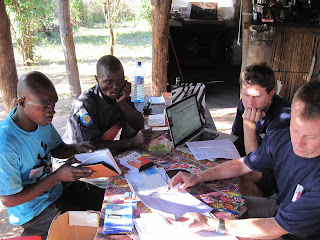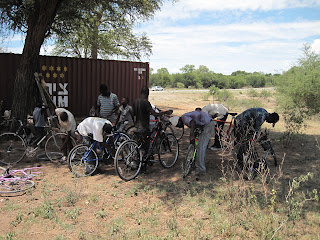We needed a guy, and Erasmus knew where to find him.
When we first drove up to Diwiwi Welding, we found a hand-painted sign with a spider logo, a shack with a sliding metal door (instead of the wood ones that were typical), a bunch of random metal debris in the yard, and nothing else.
The proprietor, Alex, was nowhere to be found. Erasmus walked behind the shack and disappeared for ten minutes or so. While he was gone we were more than a little worried. We had just three full work days before we'd have to leave, and there was a lot to be done. What if he was away from the area entirely? There wasn't exactly a lot of competition for metal fabricators on the west end of the Caprivi, and if this was the case we'd probably be completely out of luck.
Thankfully Erasmus learned from Alex's family that he had gone to the local market and that we could find him there. The exchange at the market was an interesting one. We indeed found Alex immediately, he stuck out from the crowd with his stylish woven fedora hat and oversized sunglasses. We introduced ourselves, outlined what we needed done, and asked him for an estimate.
"Neh-GWAH-she-ate" was his response.
After we figured out this meant he wanted to negotiate, it was pretty obvious he'd be doing his best to extract as much money from the foreigners as he could. It wasn't surprising of course, business is business, but we spent a frustrating little bit of time going back and forth with him and not getting any kind of number on the table. So we told him we'd pick him up early the next morning to get to work on the project. What else could we do?
Over the course of the next few days, our experience with Alex would prove to be pretty entertaining. We borrowed a generator from Ludwig's neighbor to supply him with power, and he brought a 110 volt hobbyist-style stick welder along with a large angle grinder and a power drill. These things were unheard of in the local villages, so we were more than thankful that he was so well equipped.
He worked long, hard days in the hot sun the entire time, but let's just say precision was not his forte. He mistakenly cut the bottom slice for the door much too long, and he had to cut and re-weld the door frame section after messing it up more than once. Yet in the end, Alex did get the jobs done that we needed, and in the bush with triple digit heat and little shade, this was certainly no easy task.
The man was quite a character, to be sure. His mastery of english was not nearly as good as Erasmus and Ludwig's, but when he did speak it he would often do so in a drawling style that seemed, maybe, to be on purpose. Even a bit cocky, perhaps. And when the time finally came to "negotiate," he took his demands much farther, even, than we expected him to. For example, one of the things he tried to charge us for was travel expenses, even though we went well out of our way to pick him up and drive him home every day. He tried to charge us for materials as well, but we provided everything right down the the welding sticks and cutting wheels.
In the end, we handed the dealings with Alex over to Erasmus and Ludwig. We knew they had a real grasp of what constituted a fair price here, and we wanted to see how they would handle one of their first business deals. This proved to be a good move, and the boys impessed us once again. They went back and forth with Alex line-by-line, and after much hemming and hawing his fee ended up being one third of what he showed us to begin with. It was still a kingly sum for a typical worker in the Mutjiku area. But really, when you need metal fabrication done in the bush in Namibia, you've gotta have a guy. And sometimes that guy's just gotta get paid.




























































